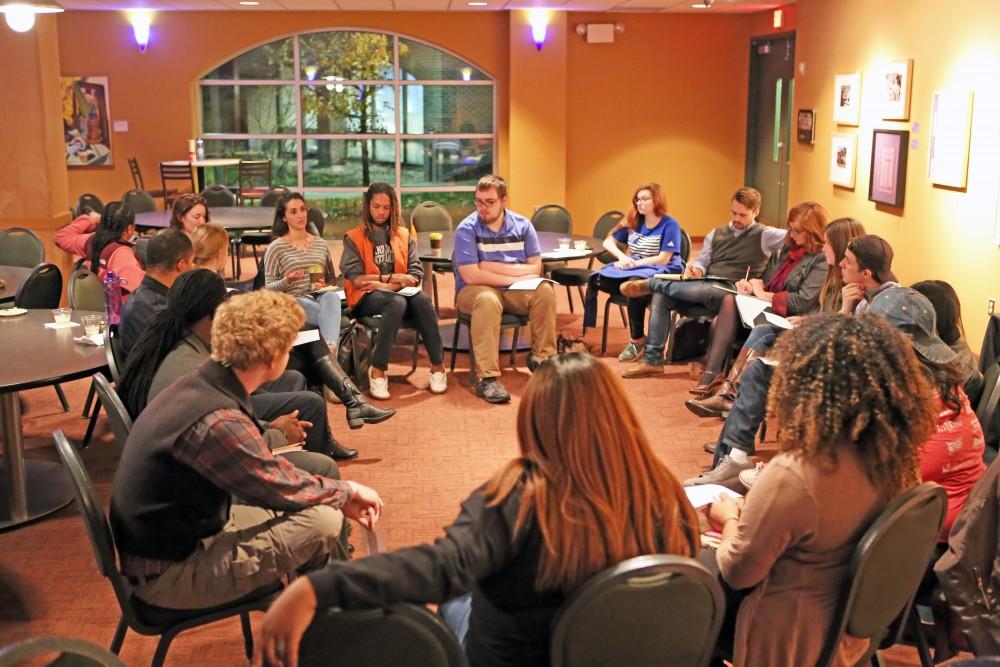Post-election town hall focuses on different perspectives, positivity

GVL / Emily Frye Post-election townhall meeting on Monday Nov. 14, 2016
Nov 17, 2016
To help Grand Valley State University students process the results of the 2016 presidential election, GVSU’s student senate, the Division of Inclusion and Equity and the Community Service Learning Center co-hosted the first of several post-election town hall meetings.
The discussion-based event, held Monday, Nov. 14 in Kirkhof Center, gave students an opportunity to express their thoughts and possible concerns about the statistically unexpected win by President-elect Donald J. Trump.
Roughly 20 students attended the event moderated by Melissa Baker-Boosamra, associate director of student life, civic engagement and assessment, Relando Thompkins-Jones, Division of Inclusion and Equity social justice educator and Ella Fritzemeier, student senate president.
The attendees dissected a variety of election-based issues, including the potential ramifications for different minority groups and the future of foreign and domestic policy under the Trump administration.
While many attendees expressed disappointment or shock at the election results, some described their efforts to remain optimistic and go about their daily lives despite being sorely disappointed by Trump’s win and fearful about the future.
“I realized that I couldn’t let this one person whose decisions might affect my day-to-day life (keep) me from going to the hospital to take care of a sick kid,” said Brandon Fitzgerald, student senate vice president for diversity affairs. “I started to reach out to people that I don’t necessarily talk to every day, (especially) the ones that I know might feel especially triggered by this because of their different marginalized backgrounds.”
Fitzgerald stressed the importance of also reaching out to people who may hold differing viewpoints, citing the disenchantment of many Trump supporters as a source of possible connection for people who voted against him.
“A lot of the people who voted for Trump had some type of feeling that they were being neglected by the system, as well,” he said.
Although many of the opinions expressed at the town hall meeting were decidedly “anti-Trump,” Fritzemeier said the event, which had been scheduled prior to the conclusion of the presidential election, was intended to be open and welcoming to people of any viewpoint.
“It was supposed to be for anybody of all backgrounds, no matter who you voted for, to come out and just talk through, process through, learn other people’s sides and perspectives and really come together,” Fritzemeier said. “I think it’s really important to hear different perspectives and hear different sides for things and it really helps process through what may have happened, no matter if you’re happy or sad.”
The town hall meeting concluded with a look toward the future: What, then, can students do in response to the election results? Baker-Boosamra said students can try to connect with different people and organizations and volunteer with causes about which they genuinely care to move forward and make a positive impact on the community.
“I think something that makes a difference is choosing something,” Baker-Boosamra said. “Choosing an issue and then looking for people in organizations who share that interest and starting there.
“As we think about what’s to come, recognizing the diversity of groups and people who are potentially in harm’s way, (I) think it’s important for us to take a look at who those potential allies are and look for ways to build relationships and coalitions with those folks across issue, across policy.”
The next post-election town hall meeting will be Monday, Nov. 28 in the Kirkhof Center Thornapple Room from 9 p.m. to 11 p.m.

























